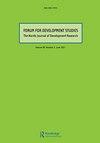谁成为农民?:津巴布韦西北部赞比西河谷中部边境地区的移民农民与棉花经济
IF 1.1
Q3 DEVELOPMENT STUDIES
引用次数: 3
摘要
摘要农民支持系统,主要由国家提供,长期以来一直被认为是津巴布韦农业发展的核心。虽然这在一定程度上是正确的,但本文的主要论点是,这种视角未能把握无产阶级化与农村农业之间的复杂关系,以及农村经济在农村家庭生活过程中的意义。本文通过关注赞比西中部农民的经历来阐述这一论点,以说明他们是如何通过投资就业积累的收入来发展成功的农业事业的。这些农民以前是无产阶级。因此,农村生产满足了退休或裁员后的收入积累需求。赞比西河中部的边界提供了积累的空间,因为有土地和劳动力可用于广泛的农业。该文件表明,推动农业发展的主要方面是获得就业积累的金融资本,这使农民能够利用新环境提供的机会。最后,它审查了这一案例研究对该国农业发展的政策影响。本文章由计算机程序翻译,如有差异,请以英文原文为准。
Who Becomes a Farmer?: Migrant Farmers and the Cotton Economy in the Mid-Zambezi Valley Frontier Region, Northern-Western Zimbabwe
Abstract Farmer support systems, mainly by the state, have long been considered as central in the agricultural development in Zimbabwe. While this is partly true, the main contention of this paper is that such a perspective fails to grasp the complex relationship between proletarianization and rural agriculture, and the significance of the rural economy within the life course of rural households. The paper develops this argument by focusing on the experiences of farmers in the mid-Zambezi to illustrate how they developed successful farming careers by investing income accumulated from employment. These farmers were formerly proletarianized. Rural production, therefore, met their income accumulation needs after retirements or retrenchments. The mid-Zambezi frontier offered scope for accumulation because of the availability of land and labour for extensive farming. The paper illustrates that the main aspect driving farming was access to financial capital accumulated from employment, which allowed farmers to take advantage of opportunities offered by the new environment. It concludes by examining policy implications of this case study for agricultural development in the country.
求助全文
通过发布文献求助,成功后即可免费获取论文全文。
去求助
来源期刊

FORUM FOR DEVELOPMENT STUDIES
DEVELOPMENT STUDIES-
CiteScore
1.80
自引率
14.30%
发文量
24
期刊介绍:
Forum for Development Studies was established in 1974, and soon became the leading Norwegian journal for development research. While this position has been consolidated, Forum has gradually become an international journal, with its main constituency in the Nordic countries. The journal is owned by the Norwegian Institute of International Affairs (NUPI) and the Norwegian Association for Development Research. Forum aims to be a platform for development research broadly defined – including the social sciences, economics, history and law. All articles are double-blind peer-reviewed. In order to maintain the journal as a meeting place for different disciplines, we encourage authors to communicate across disciplinary boundaries. Contributions that limit the use of exclusive terminology and frame the questions explored in ways that are accessible to the whole range of the Journal''s readership will be given priority.
 求助内容:
求助内容: 应助结果提醒方式:
应助结果提醒方式:


